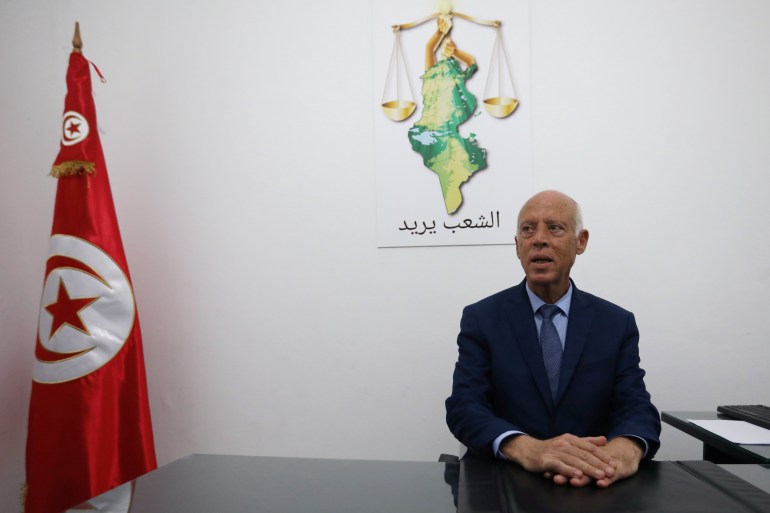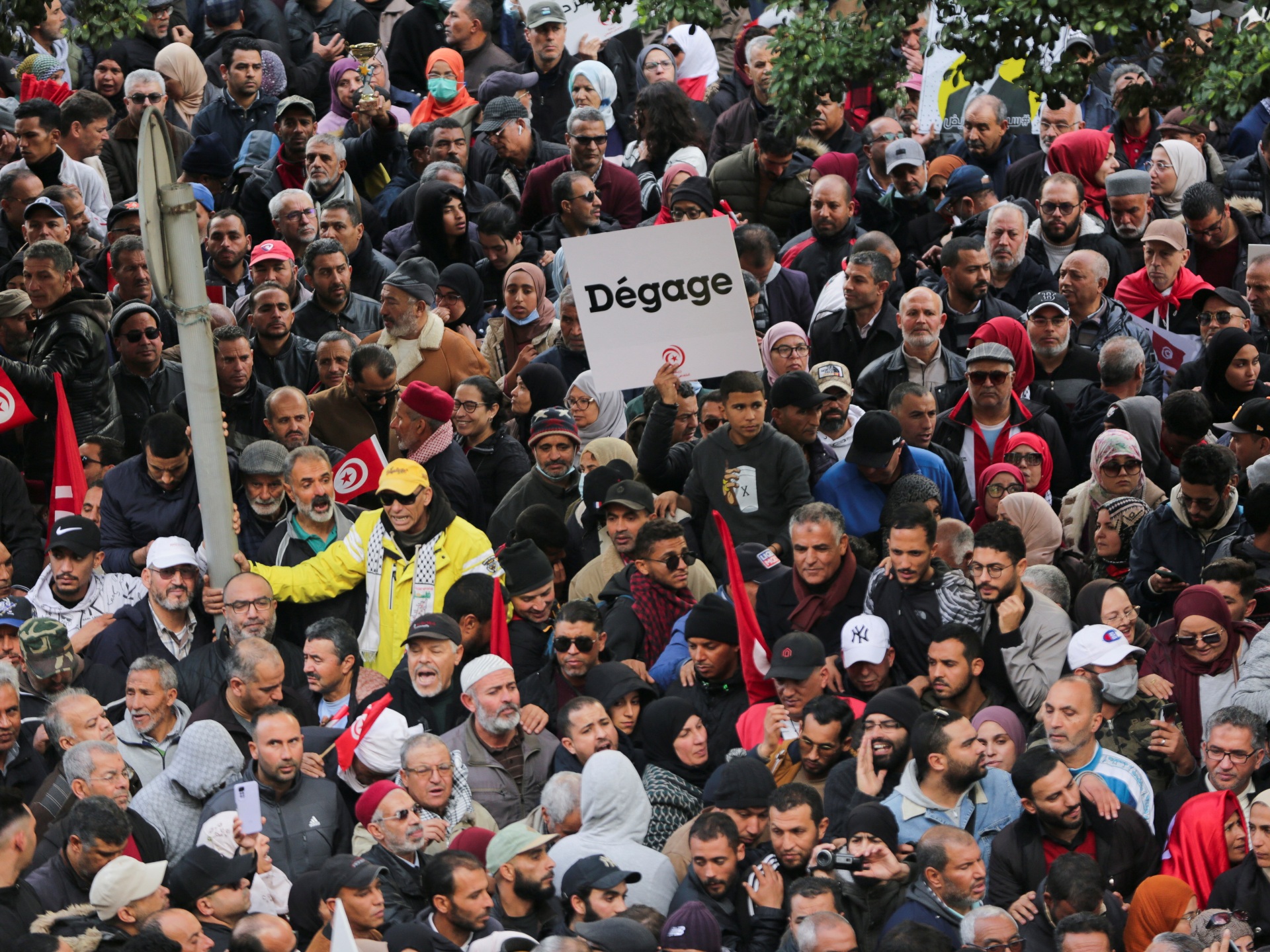Tunis, Tunisia – Mounia Brahim shakes as she recounts the arrest of her husband Abdelhamid Jelassi, a former politician from the Ennahdha party, from their home in the Tunisian capital.
“About 8pm Saturday [February 11], there was a banging on the garden gate. In the time it took my husband to walk to the front gate [to see who it was], uniformed policemen were climbing over our garden wall, then walked straight into our apartment, taking his phone and iPad and my mobile and laptop,” she said.
Jelassi is among several people whose often-violent, night-time detentions have shocked the country and drawn international condemnation while raising fears over a crackdown on dissent. They include those with ties to the opposition, critics of President Kais Saied, businessmen, the head of a leading radio station, lawyers and a former diplomat.
Brahim said the men showed neither any police IDs nor a warrant even when she demanded, but she noted they were wearing the civil police uniform.
“They told me they were from the Ministry of Interior but wore civil police uniform,” she added, and then they took her husband. He is currently being held in pre-trial detention in Mornaguia prison.
‘Another round of dictatorship’
For Brahim, this is history repeating itself. She said she and her husband were imprisoned and tortured under Zine El Abidine Ben Ali, the former president who fled the country in 2011 following protests against his oppressive rule.
“We’ve returned to another round of dictatorship, but this time it is much tougher,” she said.
Referring to what felt like a home invasion, she added, “I feel that there is no longer any dignity. I’m under surveillance and I really fear for my safety.”
That same night, Khayam al-Turki, a member of the centre-left Ettakatol (Democratic Forum for Labour and Liberties) party, was taken from his house after midnight and is currently detained under terrorism laws from 2015.
Like al-Turki, businessman Kamal Ltaief, reputed to be a powerful lobbyist, was also held under the counterterrorism law.
Ltaief, who was once very close to Ben Ali and helped him rise to power in 1987, survived investigations during the 2011 revolution to continue his business and investment interests.
Former diplomat William Lawrence, a professor at the American University in Washington, DC, told Al Jazeera: “Ltaief likes to call himself Tunisia’s de facto vice president after 1989 [and] has been described as a power broker or kingmaker, he has that skill of brokering deals.”
Al-Turki’s lawyer, Ridha Bel Hadj, said his arrest is related to his meeting with two American diplomats. The police case notes mention the licence plate numbers of the diplomats’ cars, the lawyer said.
Bel Hadj explained that there has been no formal charge against al-Turki, but a suggestion of his “forming a criminal gang to harm the Tunisian state”.
“The case against them is empty. They are using the terrorism law to hold them for a maximum of 15 days without charge or consultation with a lawyer,” he said, explaining that it was used to gain time.

Trampling dissent
Several arrests have been made since Saturday. Rights group Amnesty International has so far documented 10 arrests. Apart from politicians, those being held are accused of price fixing, market manipulation or creating food shortages.
Tunisians have for months been suffering from shortages of food – even basic necessities such as oil, sugar, milk and butter – with the government attempting to stave off bankruptcy while trying to negotiate a refinancing loan from the International Monetary Fund.
Saied has added fuel to the fire by accusing some of those detained recently of being responsible for the price increases and food shortages while pledging to “purify the country” using the justice system.
Chaima Aissa, a leader of the National Salvation Front, said al-Turki has been organising meetings of key opposition figures since December 27 to develop a roadmap to exit the crisis and rebuild the country.
Aissa is already facing charges of criticising the president on a radio interview under the cybercrime decree law of September 2022. She is currently at liberty, but under a travel ban awaiting trial in a military court and could potentially face years in jail if convicted.
Saied has faced criticism and scrutiny from both the international community and human rights groups for his use of military courts to try citizens.
“Saied is creating a diversion, he’s mixing political targets with criminal cases to give an impression that political actors are responsible for price rises and food shortages,” Aissa told Al Jazeera.
“Saied is using the terrorism act and price fixing accusations to get public sympathy, it’s pure populism,” said Bel Hadj, adding that it was merely a meeting of a group of politically like-minded people.
On Monday night, Ennahdha’s vice president and former justice minister, Nourredine Bhiri, 64, was taken into custody. The moderate Islamist party was the largest in parliament until the assembly was suspended in 2021 by Saied.
Bhiri had been previously arrested, and his location was only disclosed when he fell ill from being on a hunger strike. He was finally released in March 2022.
Bhiri’s lawyer Samir Dillou told Al Jazeera that police assaulted his wife, arrested him and later beat him in custody.
“His right shoulder was broken and he received other injuries to his leg,” said Dillou. “Surgery on his shoulder was delayed,” the lawyer added, also explaining the concerns as Bhiri is elderly, with diabetes and hypertension.
The arrest of Nourredine Battou, the director general of Mosaiq FM, the country’s largest radio network, on the night of February 13, has been condemned by the journalist and radio unions. He was known for giving a platform to those critical of Saied and his administration.
The radio station was a private company, but the state took part ownership after the 2011 revolution. Bel Hadj sees the arrest of Mosaiq FM’s head to gain control of its editorial line and silence critical debate and intimidate journalists.
On Thursday, the Tunisian journalists’ union SNJT demonstrated in front of government buildings, the Kasbah, denouncing the worsening working conditions and arrests.
Lawyers have also expressed concern over the surveillance that both Tunisian political figures and foreign diplomats are under.
Aissa noted that policing was back to the Ben Ali days when even being seen with a foreign journalist in a car was dangerous. “They could make up a charge against me. Saied has arrived at a new level of harassment, he’s creating an atmosphere of fear and people are really afraid.”
A return to autocracy?
UN High Commissioner for Human Rights Volker Türk expressed concern “over the deepening crackdown against perceived political opponents and civil society”, while the US State Department’s spokesperson Ned Price said “it is a core US principle that people around the world should be able to express themselves without fear or reprisal”.
Lawrence said diplomats “almost always know when they are being surveilled, it is a standard part of diplomatic practice”, adding that reports of surveillance would be followed up with an investigation.
“The issue is that the US is a major security ally of Tunisia and the US is spending a lot of money to bolster security forces including surveillance [since the 2015-16 terror attacks on Tunisia],” he said.
Tunisia is turning its enhanced surveillance capacity on Tunisian politicians meeting with US diplomats and then accusing them of conspiracy to harm the state, he noted, adding that “all that bodes very badly for the US-Tunisia relationship going forward”.
“If he [Saeid] wants to supplant the American role with the Russians or Chinese, it doesn’t help his case for Tunisia to be a good security partner with others in the future.”
Lawrence added that “if he does this today with the US he could do [it] tomorrow with another security partner, it is security and diplomatic malpractice”.
Speaking on Tunisian television on Thursday, Dillou said 14 lawyers, including himself, have been summoned for trial in March.
He believes that they are being targeted because they are representing political figures and critics, and “the number will possibly be increased. Some could be arrested even before the date set for their court appearance.”
There will be more arrests, Bel Hadj said. The president “is blocked inside his own political programme. I think Saied has no choice but to continue to exercise his authoritarian power.”
